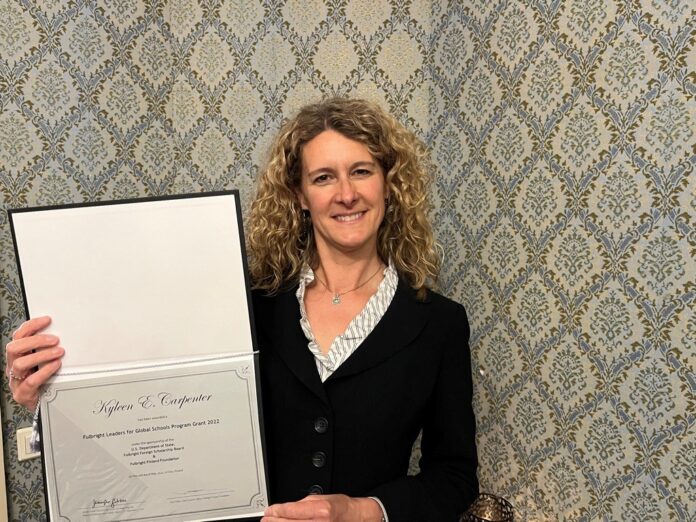
Kyleen Carpenter is the head of school of Blackstone Academy Charter School in Pawtucket. She is a Fulbright scholar and spent time in Finland to understand the country’s way of learning.
Carpenter spoke with Providence Business News about her time in Finland and how she plans to apply her knowledge locally.
PBN: How did you become interested in being a Fulbright scholar?
CARPENTER: I had always wanted to apply for a Fulbright because I believe strongly in global and intercultural learning, but Fulbrights are typically for K-12 teachers and folks teaching in higher education.
When I saw this opportunity come, which was specifically for U.S. school administrators, I sent in my application. Our trip was supposed to happen in March of 2020, and again in January 2021, but was postponed twice due to the COVID-19 pandemic. I’m so grateful we were able to travel, finally, in early May of this year.
PBN: Did you choose Finland for your trip or was it the scholarship program that selected the country?
CARPENTER: Scholars had two locations to choose from – Finland and Singapore.
PBN: How long were you in Finland and what did you learn on the trip?
CARPENTER: We spent 11 days in Finland – eight in Helsinki and three in Oulu, a city in the sub-Arctic Circle. In total, we visited eight different schools and teacher training programs to learn about the Finnish educational system, one of the best in the world.
We also had the opportunity to hear from local and national educational leaders, including a visit to the U.S. Embassy. All in all, I learned that the schools in Finland are of such high quality because teachers are making the decisions about how the national curriculum is implemented. School leaders spend their time setting up the conditions for the teachers to do that work.
Studying to become a teacher in Finland is an extremely selective process and teachers are highly trained. The school environments feel very relaxed – students are quite independent and learn in an inquiry-based model.
PBN: Of all the elements you learned on the trip, what stood out to you the most?
CARPENTER: The trust put in the teachers and students to put their best work and learning forward. Finland does not have a teacher evaluation system and there is no standardized testing for students until their upper secondary students – equivalent of our 10th graders – begin their preparation for university. About 50% of students choose a vocational track and the other 50% choose university track – but there are always options for students who change their minds.
PBN: What do you hope to apply from the trip to your work at Blackstone Academy?
CARPENTER: If anything, the trip affirmed to me that Blackstone Academy’s effective model of teacher-led and inquiry-based education is endorsed on an international level.
Finland’s focus on the well-being of the whole child and commitment to community exactly mirror Blackstone Academy’s. That said, I definitely saw so many examples of students learning – and teachers teaching – joyously because they were doing so in a pressure-free environment. I was reminded that we can have rigorous educational programming without the pressure and stress typically seen in U.S. schools, especially high schools.
James Bessette is the PBN special projects editor, and also covers the nonprofit and education sectors. You may reach him at Bessette@PBN.com. You may also follow him on Twitter at @James_Bessette.












